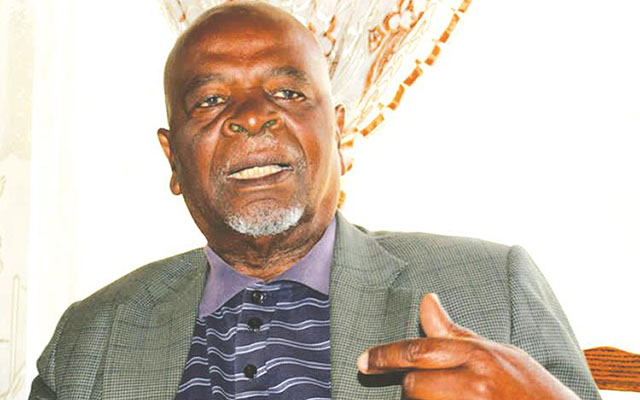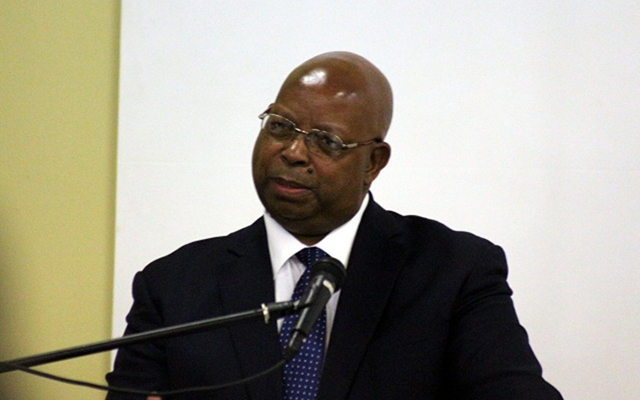UPDATED: Veteran politician Ndlovu dies


Cde Naison Khutshwekhaya Ndlovu
Herald Reporters and Bulawayo Bureau
Veteran politician and nationalist Cde Naison Khutshwekhaya Ndlovu has died.
He was 86.
Cde Ndlovu, a Zanu-PF Central Committee member and former Deputy Senate President from 2008 to 2013, succumbed to prostate cancer in Suburbs, Bulawayo, at around 2am yesterday.
His wife Sithokozile said Cde Ndlovu, who had been battling prostate cancer for a long time, passed on at his daughter’s home.
Cde Ndlovu, who was the national chairman of PF Zapu at the signing of the Unity Accord in 1987, was the first black mayor of Bulawayo, assuming the post in 1981 and serving two terms.
He was the only surviving member from the PF Zapu side involved in initial talks towards uniting PF Zapu and Zanu.
As news of Cde Ndlovu’s death spread yesterday afternoon, mourners started gathering at his Luveve suburban home.
Among the mourners were Zanu-PF senior officials Cdes Absolom Sikhosana and Molly Mpofu.
Cde Sikhosana described Cde Ndlovu as an astute leader and a fountain of wisdom.
“We are very devastated by this development because we were not expecting it,” he said.
“We thought from the assistance he was getting he would pull through, unfortunately this is what has happened. We are pained and shocked by the departure of the veteran leader and one of the founding fathers of our liberation.
“We have lost a fountain of wisdom, a fountain of knowledge and somebody whom we were looking up to for guidance and someone who was senior and experienced. We feel very empty. His departure leaves a void which will be very difficult to fill.”
Commenting on Cde Ndlovu’s hero status, Zanu-PF secretary for Administration Cde Ignatius Chombo yesterday said: “We are waiting for the request from his province. The family has not yet spoken officially and when we receive the information we will inform the party leadership for due processes to take place.
“I am sure there will be a formal announcement, most probably by tomorrow (today).”
Zanu-PF Politburo member Cde Joshua Malinga, who is a nephew to Cde Ndlovu, described him as a committed, consistent and very progressive man.
“He was always consistent and very progressive in thinking and deeds,” he said.
“He has been consistent, persistent before, during and after the liberation struggle till his death.
“On the Zapu side, he worked very well with others and rose through the ranks to become the party’s national chairman.”
Cde Malinga said he first met Cde Ndlovu at Jairos Jiri Centre and the nationalist taught him leather craft.
As a former mayor, Cde Malinga said the late veteran leader provided the direction which all other mayors were to follow.
“It was not an easy job because he had to balance blacks and whites without seeming to be racist . . .” he said.
“Cde Ndlovu was never a corrupt man and of late he was worried about the high levels of corruption in the country. He also loathed tribalism, which he said was retrogressive. And political wise he wasn’t happy about the factional fights in the ruling party.”
Zanu-PF chairman for Bulawayo Cde Dennis Ndlovu said he worked with the late Cde Ndlovu in 1980 when they were both councillors.
“I first worked with Cde Ndlovu when he was a PF-Zapu central committee member and we later worked together when he became mayor of Bulawayo and I was a councillor,” he said.
“From being mayor he was elected a Member of Parliament and we continued working together in Zanu-PF after the signing of the 1987 Unity Accord.”
Cde Ndlovu was born in Gwatemba, Filabusi on October 22 1930 and was educated at Zezani Secondary School in Beitbridge where he did Standard One and Two.
He went back to Gwatemba to finish Standard Three before proceeding to Wanezi Mission for Standard Six and later proceeded to Umzingwane Government School where he trained in leather work.
After attaining a certificate in leather work, Cde Ndlovu taught at Zezani School and Matopo Mission in 1950 and 1953 respectively before proceeding to Empandeni Mission.
His last teaching job was at Jairos Jiri Training Centre in Bulawayo from 1956 to 1965 before joining politics.
His life changed because he was continuously detained after the infamous Unilateral Declaration of Independence by Ian Douglas Smith.
Cde Ndlovu came to Bulawayo in 1956 and this is the time when the influence of the Southern Rhodesia African National Congress (SRANC) was beginning to be felt.
He met other luminaries like the late Cde Joshua Nkomo.
The SRANC was strongly campaigning against the Federation ofRhodesia and Nyasaland.
The Smith regime became more brutal and many detention centres were set up at Khami, Gonakudzingwa, Marondera and other areas.
Soon after the banning of the SRANC, the National Democratic Party was formed and Cde Ndlovu was not in the leadership structures.
He became active when the NDP was banned in 1960 and succeeded by the Zimbabwe African People’s Union (Zapu) in 1961.
He was co-opted into the structures of Zapu as a committee member.
After the banning of Zapu around 1962, the People’s Caretaker Council was formed to lead the struggle.
Cde Ndlovu was very influential in the formation of the Bulawayo United Residents Association in 1962.
In 1963, together with the late Cdes Jason Moyo, Grey Bango and Senator Chief Mutasa, they formed the Bulawayo Residents Association and he became its chairman.
In 1964, the settler regime detained almost all the nationalist leadership for organising mass resistance, boycotts and protests and Cde Ndlovu was incarcerated at Gonakudzingwa.
When he came out in 1968, he and other nationalists campaigned for a stay of execution for two “Crocodile gang” fighters captured after they had killed a white man in Odzi.
The campaign was unsuccessful and Cde Ndlovu realised that the only option was to recruit more people for the war even though there were efforts to negotiate through the African National Council led by Bishop Abel Muzorewa.
In 1971, Cde Ndlovu was detained again after campaigning against the Pearce Commission proposals.
When the then ANC vice president Canaan Banana escaped the country the same year, Cde Ndlovu became vice president of the ANC.
In 1973, he was detained for recruiting and feeding the Zimbabwe People’s Revolutionary Army (Zipra) guerillas.
On release in 1975, he briefly continued working with the fighters, but soon got a word that the Rhodesian forces wanted to eliminate him.
He escaped to Zambia via Botswana and six months later his father was murdered when an arms cache was found at his home.
In Zambia, Cde Ndlovu became a member of the War Council and Coordinated Production Activities of Zapu until his return to Zimbabwe in January 1980 following the successful conclusion of the Lancaster House negotiations.
Cde Ndlovu remained very active after the liberation struggle, although he was not very actively involved in central Government.
He became the first black councillor for Luveve in 1981, the same year he was elected the Bulawayo mayor for a two year term.
As a councillor and mayor, Cde Ndlovu will be remembered by the people of Bulawayo for calling for sitting tenants to buy the houses they had been renting for over 40 years.
Working with the first local Government Minister, the late Cde Eddison Zvobgo, Cde Ndlovu influenced the purchase of homes.
People who had been renting homes in Mzilikazi and Makokoba in Bulawayo since the early 1940s were given the houses on the basis that they had already paid off the money through rentals.
The Bulawayo city council under Cde Ndlovu took advantage of the schemes that were introduced by Cde Zvobgo, while many other city councils resisted them.
Under the scheme, some houses were built in Emakhandeni, Entumbane and Nkulumane in Bulawayo and people called them the “Zvobgo houses”.
In 1985, Cde Ndlovu contested for the Insiza Parliamentary Constituency, a seat he held until June 2000 when he lost to the MDC.
He was representing one of the biggest constituencies in the country, covering Fort Rixon, Filabusi and parts of Esigodini and Gwanda.
During his term as Member of Parliament for three terms and later as Senator for the same constituency, Cde Ndlovu did a lot for the area.
When he took over in 1985, it was immediately after independence and Ian Smith’s Government had done nearly nothing to improve the lives of Zimbabweans in the constituency.
Cde Ndlovu is survived by wife Sithokozile and two children.
Mourners are gathered at number 5649 Luveve 4 suburb.







Comments